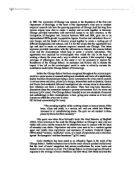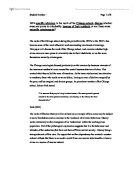Chicago sociologists were conscious of the major movements in social thought and held strong theoretical interests. Pragmatic influences run throughout the various traditions of research established at Chicago. The Chicago school of pragmatism was a central force in philosophy, contesting realism and idealism for supremacy in metaphysics, epistemology and value theory. Both the Sociologist and Pragmatists were responding to the rapid growth and industrialisation of the city they were living and thinking. These changes included ubiquitous transformation of social life such as waves of immigrants from not only other parts of the US, but also Europe, Asia and Africa. What contributed the success of the Chicago School, was the explicit combination of theory and research. It has been noted that Chicago School played a huge part in the transformation of Sociology as a discipline, by providing the foundations for empirical studies within Sociology. For some Chicago sociologists, Sociological theory was an alternative to religious and theological thinking that had subjugated their lives.
The publication of The Polish Peasant in Europe and America was a massive move forward and of significant importance. The Polish Peasant marked a shift in Sociology away from abstract theory and library research, toward a more intimate acquaintance with the empirical world. The Polish Peasant helped strengthen sociology, as an independent academic subject discipline because of the subject matter was unconventional and divergent. Although not the first American monograph, it was the first to integrate theory and data in a way no other American study had done before. W.I Thomas and Znaniecki worked hard on this massive study, and received substantial outside funding. Helen Culver, heiress of the Hull of Hull-House donated the then enormous sum of $50, 000 with which to carry out the research into immigrant problems. The scale of Polish migration to the United States was very large. Between 1899 and 1910, Poles accounted for one quarter of all immigration to the United States. They tended to settle in urban areas, such as Chicago. Such immigration was due to political, religious and cultural persecution in Eastern Europe. As well as the persecution endured, economic prospects were higher in the United States. Thomas’s approach involved moving out of the library into the field. However, he did not use the firsthand methods of the early social survey or participant observation. His main research method was what he called “documentary materials.” Over a third of the text is devoted to personal letters between Polish immigrants of peasant background and members of their families’ back in Poland. Put together with church records, written evidence from legal agencies and Polish-American societies, it provided a substantial insight into immigration trends in Europe and America. One of the main influences into the study has been the availability of certain types of documents. The use of letters as sociological data was original to Thomas. However, he faced familiar methodological problems of gaining the trust and securing the trust of those he was studying. Their general methodological ideas were set out in an 86 page “Methodological Note” at the beginning of the book.
Intensive field research, the collection of personal documents and life histories, and an approach to social behaviour from the subjective point of view of social action were all very important strands in the work of the Chicago School of sociology in the 1920s. There is no evidence that Thomas took any particular interest in statistical work or the collection of quantitative data. There are scarcely any figures given at all in The Polish Peasant, and none of his other writings make much use of quantification. Robert Park is likewise thought not to have been interested in quantitative data. Park’s general methodological position emphasised the importance of studying the meaning of action and understanding social processes. He was not proficient in quantitative methods and in his later years at Chicago, perhaps provoked by the advent of Ogburn, was sometimes critical about them. He was sceptical, but he also encouraged a certain amount of quantitative work himself.
The ambivalent relationship between the Chicago School and subsequent Marxist scholars is an important topic. There was always suspicion into the connection with John D. Rockefeller, who provided financial backing for the founding of the university. Commentators claim that some of the sociologists were “under instructions from the capitalist censorship that controls the University of Chicago.” A number of commentators have also noted that many of the Chicago sociologists were influenced by Protestant Christianity, and tried to free themselves from that influence.
The Chicago School was very much interested in the ecological approaches to crime. Chicago typified the growth taking place in the 20s and 30s. The period, in which they were doing their research, the 1920s and 1930s, was an interesting period criminologically because of such factors as Prohibition and the Great Depression. In Chicago, a number of criminal gangs had emerged in order to supply the underground economy with a contraband product--alcohol. The depression allowed criminologists to test whether criminality and economic downturns were related.
Park claimed cities, like Chicago were super organisms. Robert Park and Ernest Burgess introduced an ecological analysis of crime causation. Ecology is the study of animals and plants and how they relate to one another in their natural habitat. Park and Burgess then examined area characteristics instead of criminals for their explanations of high crime. They developed the idea of natural urban areas, which consisted of concentric zones, which extended out from downtown central business district to the commuter zone at the fringes of the city. Each zone had its own structure and organisation, characteristics and unique inhabitants. This had been known Burgess' Concentric Zone Theory. The Chicago School developed the concept of Social Disorganisation. It refers to the explanation of deviance and a state of society it produces. Crime was seen as a product of the uneven development of society, with change and conflict, which affects the behaviour of the people within it. This theory emphasised that society was organised when people are presumed to have developed agreement about fundamental values and norms, with behavioural regularity. Social organisation, or social order, exists when there is a high degree of internal bonding to individuals and institutions in a conventional society. This cohesion consists largely of agreement about goals that are worth striving for and how to behave and how to not behave. Simply put, social disorganisation is social disorder.
They believed that social organisation involved an integration of customs, teamwork, high morale, and bonding. This led to harmonious social relationships. Such a group showed solidarity and homogeneous and traditional behaviour. Social disorganisation theorists believe social disorganisation existed in much of city life. They made such a relationship almost unmistakable. They used the city as their laboratory in which they studied deviance and crime. They concentrated their research on disorganised local areas, slums or inner-city areas of high crime, prostitution, suicide and other deviant forms of behaviour. Thus, in their theoretical framework, social patterns of the urban environment produced social disorganisation, which led to crime and deviance.
The Chicago School of Sociology, as seen by the inimitable methods of research of the time and alternative explanations of crime, played a huge part of pioneering American Sociology, and competing with Europe. Their emphasis on quantitative research methods allowed them to observe and examine other explanations of various theories in a different manner to conventional theorists and research methods. The importance of the Chicago School of sociology to the contribution of American Sociology is very significant. Europe dominated Sociology, and the Chicago School provided a firm, solid foundation to further developments of American Sociology. Later American Sociologist, Parsons was a functionalist. According to functionalist theories, society is regarded as effectively a type of organism in which each part (organisation) serves some purpose or function. Society as a whole tends towards being self-regulating and self-organising as people independently work towards the fulfilment of shared goals.
After the Second World War, the University of Chicago experienced an enormous influx of students whose education was paid for by the G.I. Bill. These talented and energetic students of Hughes and Blumer, having been in the war, benefited from an experience of the world until then uncommon among students of sociology. It was then argued that a later Chicago School developed after the original “Chicago School” after the 1950s. The characteristics of the early Chicago School of 1920-1950 differ considerably from the later Chicago School. They were highly suspicious of "positivistic" economic methodology and denounced economic imperialism, arguing for a confined role for economic analysis.
Bibliography
-
Shaw, Clifford R. 1931. The Natural History of a Delinquency Career. Chicago: University of Chicago Press.
-
Vold, George B. and Thomas J. Bernard. 1986. Theoretical Criminology. New York: Oxford University Press.
-
Kurtz, Lester R. 1984. Evaluating Chicago Sociology. Chicago: University of Chicago Press.
-
Smith, Dennis. 1988. The Chicago School. Somerset: Macmillan Education Ltd.
-
Bulmer, Martin. 1984. The Chicago School of Sociology. London: University of Chicago Press.







